Seattle Weekly would like to issue the following correction:
At the close of 2015 we published an article entitled “2016 Is Going to Be the Best Year Ever in Seattle!” In fact, 2016 was not the best year ever. As the planet has slowly circled the sun, we have watched our prediction fall apart, piece by piece. We regret our lack of foresight.
We hardly need to recount the litany of calamities. Bowie died. Prince died. Leonard died. Sharon died. Merle died. Trump won. Then he won again. None of these were accounted for when we penned our optimistic outlook.
We errantly cited the pending opening of the First Hill Street Car as a milestone in urban transportation in Seattle. With our offices located a block away from the line, we have been dismayed by the sluggish pace at which the trolley lopes by, especially given that this can never be attributed to too many passengers; au contraire, it often looks empty. We also noted the possibility that Washington would become the first state in the nation to institute a carbon tax to fight climate change, yet maddening environmental infighting led to the measure’s big failure on the same night we elected a president who thinks climate change is a hoax.
Even our sports predictions fell short. We posited that the Seahawks could keep their hot hand going and make another Super Bowl appearance. Nope—and despite a decent record, the team has offered plenty of evidence that 2017 won’t be its year, either. We also hoped that new Mariners GM Jerry Dipoto could finally break the team’s longest-in-baseball playoff drought. Close, but no cigar.
So, yeah, 2016. Not great, or at least not the best ever. But for all the gloom we’ve encountered this year, we must qualify our correction: It wasn’t all bad.
Take that election that delivered us Trump. It also delivered us, in Washington, a statewide $13.50 minimum wage, a win for common-sense gun control, and a massive public-transportation tax plan that promises to transform how the Greater Seattle area gets around in the coming decades. The $54 billion Sound Transit 3 package will deliver light rail to West Seattle, Ballard, Everett, and Tacoma. After many false starts, Seattle and environs finally said yes to truly mass transit. No, it won’t all be done until the 2040s, but that doesn’t mean we have to wait all that time to enjoy the fruits of light rail. While the streetcar is an apparent bust, 2016, as we anticipated last year, also heralded the glorious opening of the Capitol Hill and Husky Stadium light-rail stations. People have literally wept as they glided subterraneously from Montlake to downtown Seattle in less than 10 minutes—about the length of time it can take a car or bus to get through two stoplights in today’s traffic. And for you car fiends, how’s this for a sentence we never thought we’d write: In 2016, the Bertha plan plowed forward. The Seattle Times reports that since last spring, the massive boring machine has run so smoothly that those ever-increasing cost-overs are actually decreasing (but still stand at a sobering $149 million). Bertha is now about 75 percent done with her journey from SoDo to South Lake Union, with a planned opening in spring 2019 (three years behind schedule).
While no one would claim Seattle is affordable these days, 2016 saw some serious strides toward equitable development. While the city still hasn’t passed anything like rent control, it has put serious capital, both political and financial, behind the creation of affordable housing units. Seattle voters this year approved a $290 million housing levy that aims to build or preserve 2,500 affordable apartments, help another 4,500 people pay their rent, and enable 280 homeowners to keep their house. The City Council later voted to spend another $29 million on affordable housing. New city rules also mean that every private development in the city will include affordable units or put money toward their construction. Even before the Council approved the $29 million bond, the city was on pace to triple its production of affordable housing.
And, lastly, while the Seahawks and Mariners both fell short of our highest hopes, the Sounders exceeded them by a factor of, oh, a million? By bringing home the MLS cup for the first time in the team’s history, at the end of a season that saw them in last place in the West halfway through, the Sounders serve as a reminder that we must never give up or give in, and proof that life’s successes are often found in the least expected places.
Or at least not where prognosticating newspapers tell you they will be.
editorial@seattleweekly.com







